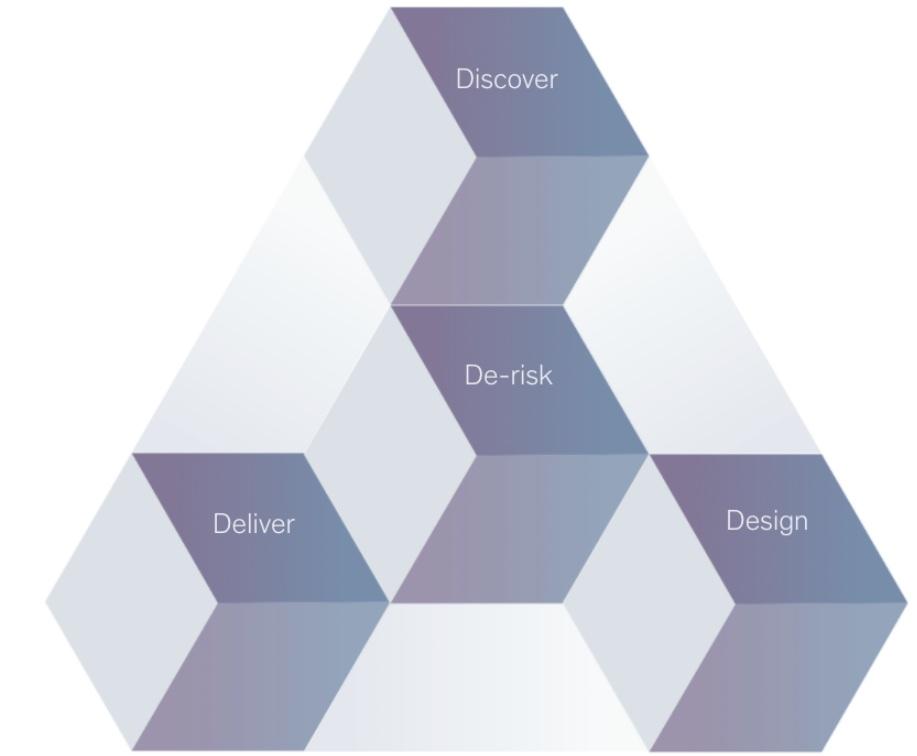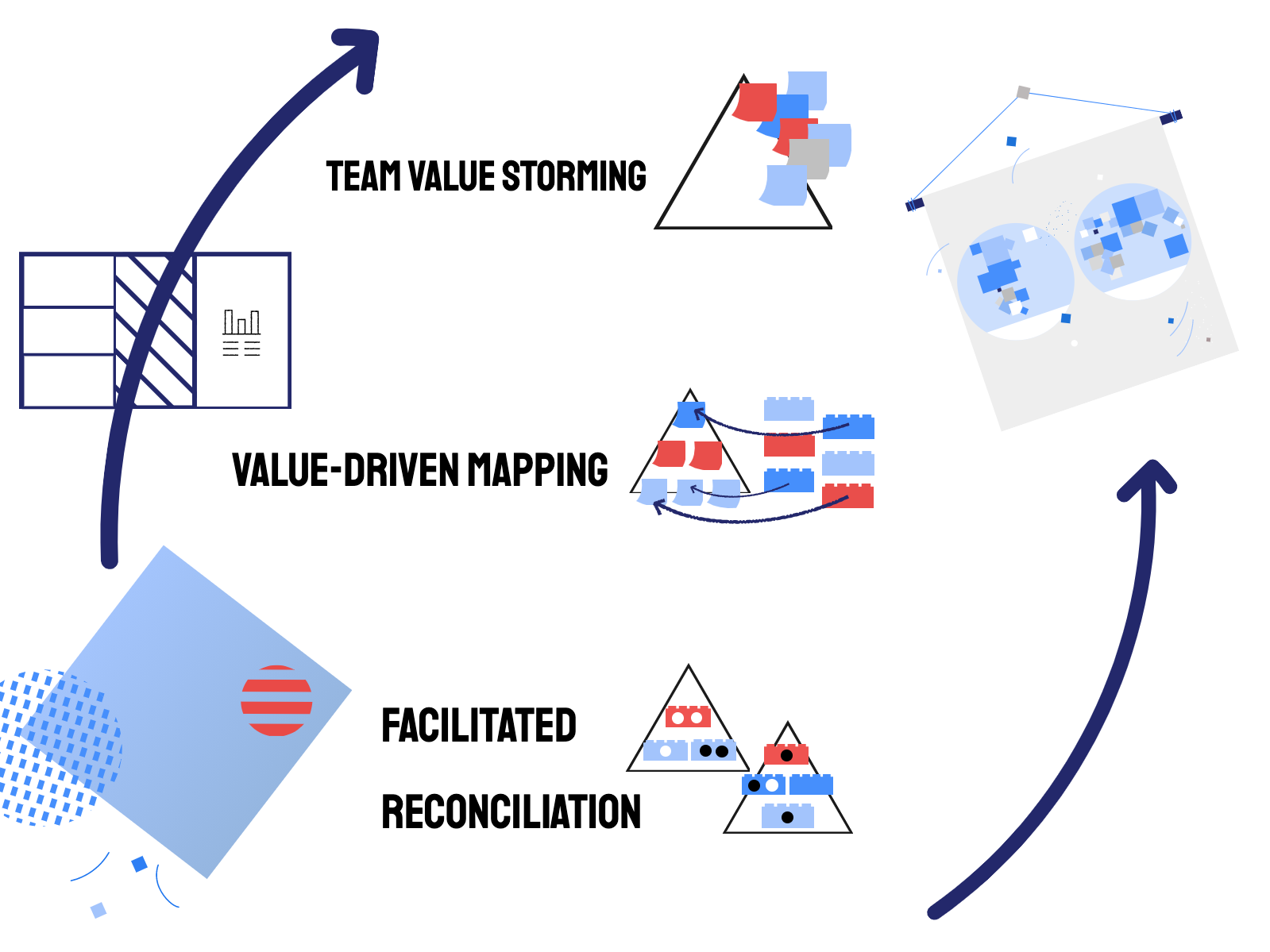Waive the uncertainty and get opportunities with Value-Focused Workshop
When the clock struck midnight on January 1, 2020, most of us optimistically looked ahead to what promised to be a prosperous year. And with good reason. The global economy was booming. The stock market reached all-time highs. Then out of nowhere, COVID-19 swooped in and triggered a seemingly overnight economic recession.
Many business owners had to close shop. Consumer needs and preferences changed, and entire markets for goods and services dried up. Businesses have been forced to find new ways to offer value to their customers to ensure both their short and long-term survival. But that is easier said than done. To make a successful strategic pivot, an organisation must employ a highly focused and proven method to identify and deliver value to customers.
Product discovery workshops are an essential tool in this regard. In this article, we will explore some popular product discovery workshops and conclude by examining a revolutionary and exciting new approach: the value-focused product discovery workshop.
Understanding the Online Workshop – Part 3
This article is part 3 in a five-part series about online discovery, product, and design workshops driven by value. Click the links below to go back or skip ahead to the next article.
What is a product discovery workshop?
In a recent blog article, we explained that a product discovery workshop is a crucial component of the initial planning phase of a product. Stakeholders have an opportunity to clearly define goals and expectations, as well as identify opportunities and potential pain points. One of the end products of the workshop is a blueprint, or product roadmap, which contains a high-level visual summary of your organisation’s vision and projected evolution of the product over time. A product discovery workshop is also an ideal opportunity to reflect on what you learned about your business during the pandemic. If your business is like most, the sudden changes brought on by COVID-19 revealed your vulnerabilities and weaknesses. Consider what you learned about your company’s vulnerabilities? How were you able to overcome them? And most importantly, how did your customers’ needs change?
Popular product discovery workshop methodologies
McKinsey approach
McKinsey utilises a model of product development that seeks to leverage data to identify and rapidly scale opportunities. Their three-prong triangular model consists of discovery, design, and delivery phases. In the discovery phase, organisations shape their strategies based on industry insights. In the design phase, they rapidly transition from idea to prototype. In the delivery phase, they establish a supporting infrastructure to scale the product.

Source: McKinsey.com
The Lean Startup workshop
The Lean Startup workshop employs a scientific approach to creating products. Like McKinsey, this methodology emphasises the rapid delivery of a product or service. Unlike traditional startups where founders invest significant time and money into developing a product, the Lean Startup prioritises learning. A core component of the model is the build-measure-learn feedback loop. Founders start by identifying a problem that needs to be solved. They then develop a minimum viable product (MVP) then used in customer research. By gathering and analysing feedback and data, founders can refine their product and ensure that the result will be something that end-users value.
The Elements of Value
In 2016, Bain & Company wrote an article that appeared in the Harvard Business Review entitled “The Elements of Value”. In that article, the authors promulgated a comprehensive model of consumer value. Their model consists of 30 fundamental attributes that fall into four broad categories: functional, emotional, life-changing, and social impact.
Source: HBR & BullsEyeResources
The model’s conceptual roots trace back to psychologist Abraham Maslow’s “hierarchy of needs”. Like Maslow’s hierarchy, Elements of value® approach focuses on the needs of people (in this case, customers). In Maslow’s model, people must satisfy their basic needs at the bottom of the pyramid before they can achieve more desirable needs at the top. In terms of providing value to customers, helping them to realise the higher forms of value (social impact and life-changing elements) leads to profitable and sustained business relationships. Not surprisingly, the authors found that companies that delivered multiple elements of value developed more loyal customers. Moreover, businesses that scored high on four or more elements achieved revenue growth that was four times greater than companies that only reached a high score on one aspect. “Elements of value®” approach is a powerful tool for reexamining and refining how you deliver value, as well as identifying new opportunities in a fundamentally different economy.
Our value-focused product discovery workshop
In times of ensuring business and society continuity, I can see more benefits of a value-driven business than ever. It’s not about publishing what are the company’s values. And it is about learning how our firm can get closer with service or product to users’ values. As an experienced software consulting company, we have helped our clients to seize opportunities by identifying and pursuing value-focused business opportunities. Moreover, as serial entrepreneurs, we have been forced to pivot by changing business dynamics. Based on our experience and direct knowledge of leading product discovery methodologies, we have created a highly useful and intuitive approach to help you identify and pivot to new and valuable business opportunities. Our value-focused product planning workshop helps to identify several core products that offer value as defined by the “Elements of value®” approach. As the Lean Startup methodology, the process starts with completing a visual chart that details the company’s unique value proposition, end-users, and infrastructure, among other factors. These factors are mapped to value pyramids structured around the functional attributes promulgated by ”The elements of value model.”

This highly collaborative process leads to customer-centric products and services. Value-focused product discovery workshop attendees leave with a detailed product roadmap and vision to ensure both short and long-term business continuity.
Product discovery workshops: a comparison
The value-focused product workshop is unique in its approach to identifying product backlogs based on customer value. This is especially important for companies that are faced with economic uncertainties and looking to exploit viable opportunities in evolving business environments.
Both the McKinsey and Lean Startup approaches prioritize getting a product to market. While this is a useful method for gathering initial user data, it fails to identify value at the outset. The value-focused approach starts by identifying customer segments, their needs, problems to be solved, and potential solutions. Following this modeling process, workshop attendees utilize a proprietary method of identifying customer value attributes. Thus, attendees develop a product backlog and/or value-focused minimum viable product at the outset, as well as key data points to guide testing.
The value-focused workshop is unique in this regard. Unlike the other approaches, attendees gain a comprehensive view of their existing offerings, identifying and developing new features and activities to deliver value. In this sense, the value-focused workshop is ideally suited for companies looking to make a strategic pivot. Moreover, the workshop is more affordable and collaborative than the other models.
Our workshop attendees develop the following:
The Value-driven Pyramid. A condensed and highly visual pyramid diagram that identifies stakeholder and customer values.
The Value-driven Backlog. Maps core features to key functional attributes. Allows attendees to craft successful products to respond to customers’ needs, as well as key segments for further improvement.
A plan. Divides the backlog into key steps that helps to prevent scope creep for untested ideas.
A list of key assumptions and ballpark.Covers the dependencies and risks which need to be considered when implementing a new idea. The ballpark estimate covers the quality and approximate value of the investment required for execution.
Pivot examples
The following are several examples of companies that have successfully pivoted in the wake of the pandemic.e, . But before we get there, it’s helpful for planning your workshop to think about the kinds of activities which will be the most useful. These include activities that help you understand and decide, activities that help you empathize, and those that help you diverge and explore new ideas.
Spotify
Spotify is an enormously successful music streaming service. At first glance, it seems as if Spotify would flourish during the pandemic with more people trapped at home listening to music. Yet most of Spotify’s revenue comes from advertisements that users of the company’s free plan are forced to listen to. COVID-19 caused significant reductions in advertising budgets. In fact, according to industry experts, ad volumes are down more than 30% from what they were before the pandemic. Spotify made a fierce pivot and found value elsewhere. One thing they did was to offer more original content in the form of podcasts. The company signed exclusive podcast deals with several celebrities and experienced more than 150,000 podcasts uploads in just one month following the initiative.
Booksy
Booksy, much like others in the beauty industry, has suffered tremendously from the pandemic. COVID-19 resulted in the appointment scheduling app having to lay off more than 50% of its workforce. Booksy identified a need in the banking and insurance industry for a queue free solution for providers to schedule appointments with customers. Booksy recognised the value and quickly pivoted, experiencing nearly instantaneous success.
How does DO OK help pivoting business?
The COVID-19 pandemic has presented businesses around the globe with seemingly insurmountable challenges. Yet the pandemic has also created a unique opportunity for companies to examine their product and service offerings to identify business models that are conducive to short and long-term growth.
The following are several of our favourite client success stories:
Versa – a patented asset tracker. A scale-up in aerospace industry made a shift towards logistics and cargo tracking. Our software design and development team was supporting that throttling process.
Fakehunter – an expert platform to fight dissemination of fake news. Together with Amazon AWS, Objectivity, and our voluntary team we led the digital transformation of a quality control of press published in multiple sources on the Internet, to help reduce stress and anxiety in 38-million country.
Actify – a platform to support your wellbeing. Seeing the rapid 40% growth of downloads in Health & Fitness apps, it was of a highest importancy to make software ready to service 100.000 Actify users.
DO OK is a world-class software consulting company. We help business owners to navigate their way through the pandemic and pivot to valuable and exciting new opportunities. In addition to our innovative value-focused product discovery workshop, we offer comprehensive and ongoing product re-design and development services. Many of our clients and workshop attendees have gone on to achieve tremendous success.
P.S. Check out our blog more often to find the next article in our series, How to Run A Product Development Workshop. That will help you understand what to expect at the next stage of the workshop process.


